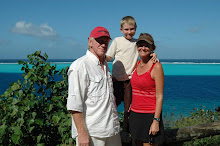After 5 months of winter and the real world's pace, we are back in Fiji and readjusting to the warmth and tropical time warp. The sea water temp in Auckland was 62* and here it is 83*! Being surrounded by that warmth, the boat and the air never really cool much.
Fiji time pretty well describes the pace of life here, especially anything official or part of the bureaucracy. If a pencil rolled off a desk at the start of lunch hour, it would probably wait to hit the floor until lunch was over. When we checked into Fiji last week, the Captain was taking care of business at the customs office while our crew waited patiently for 3 hours 'quarantined' at anchor. To continue the process, I had to go into town to an ATM to get Fiji cash for fees. The customs guy called a cab and told him to quickly take me to a bank. The cabbie asked me, "Are you on Fiji time or do you still think you are in a hurry?" I told him the customs official wanted me right back. He said not to worry, as long as I owed them money they would be there when I got back. We then proceeded to pick up one of his friends and deliver him to the other end of town before heading to the bank and back to customs. No worries.
In most countries we visit there are at least two ways to go through the clearance process with customs, immigration, health, and quarantine officials. You can do it yourself or you can use an agent who knows the process, what buttons to push (or not to push), and is probably related to at least one of the officials. There are benefits to both methods. Using an agent can be relatively expensive ($400+ USD here in Fiji) but is typically much quicker and the officials seem to look with one eye closed. Going the Home Depot 'DIY' route saves money and gives a much deeper insight into a culture. Sometimes the appreciation you gain from these experiences isn't apparent until well after you have been sitting for hours in a number of hot offices where bureaucrats welcome you and then give you an occasional smile and let you sit while they take care of more pressing business and wait for lunch.
We had cleared into Fiji last year and my memory was that it was relatively simple and prompt. Feeling the inspiration of Bob the Builder – "Can we fix it? Yes we can!" I decided to go it alone. I am still not sure where the process went astray, but Fiji time ruled and the 3 hrs the first day weren't enough to satisfy officialdom. On day 2, I had to take a car back into town (45 min from the marina) and visit 3 additional offices. I was instructed to go to the D.O.'s office (District Officer) to apply for a cruising permit. This was a new one on me, but what the heck. Cruising permits are a small part of the D.O.'s responsibilities. Here in Lautoka, she also issues building permits and anything else one may need permission for, including burial permits that the lady in line ahead of me had been waiting 4 days for. 1 1/2 hrs later, I was informed that the application had been faxed to the capital in Suva and I could pick it up in three days.
With our cruising permit applied for, it was back to my new best friend at the custom's office for the final stamp of approval. "What do you mean you don't have the permit?", he asked. "I can't issue your papers without it." I explained the process as I understood it, and he shook his head. He then picked up the phone, called someone in Suva, and proved his authority when the permit arrived on the fax 10 min later.
Including drive time, day two of our check in consumed another 3 1/2 hrs. I got to wander the downtown streets of Lautoka in search of more offices and learn that Fiji time is not arbitrarily applied to foreigners as I listened to the newly widowed lady try to get permission to bury her late husband. Cost to check in using and agent – $400 USD, cost for DIY – priceless.
Fiji Time
E

